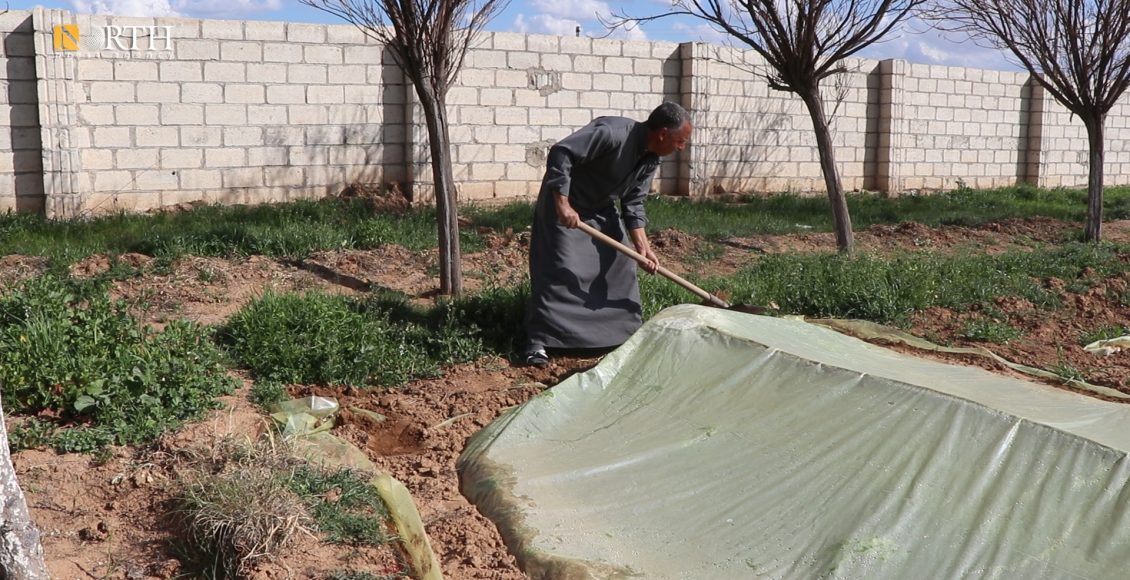IDP aspires to develop agricultural project in Syria’s Hasakah
By Samer Yassin
HASAKAH, Syria (North Press) – Aboush al-Aboush, 46, carries his shovel every day to remove weeds from his small farm cultivated with vegetables. The farm, about 0.25 acres, is located in the town of Tel Tamr in northern Hasakah Governorate, northeastern Syria.
Al-Aboush cultivates additional areas within the same farm by plowing them and planting summer vegetable seedlings. The surplus production from these cultivated areas is then sold.
Al-Aboush and his family are IDPs from the village of Qabr Saghir near the town of Zirgan (Abu Rasin), northwest of the city of Hasakah. They left it after the Turkish-backed armed opposition factions, aka the Syrian National Army (SNA), took control over the village in late 2019.
The only work he can do is farming. As a result, he has rented an incompletely equipped house along with a small farmland measuring no more than 0.25 acres for cultivation.
His three children, along with their mother, assist him in the farming activities. This farmland serves as their sole source of income.
With the beginning of each September, he starts cultivating winter vegetables such as lettuce, parsley, spinach, radishes, and others. The season for these vegetables concludes at the end of March.
When April starts, he begins cultivating summer vegetables like tomatoes, eggplants, peppers, okra, and others inside small greenhouses. He then cultivates them in neat rows and sell a portion of them to farmers.
He told North Press that he utilizes both summer and winter seasons for vegetable cultivation. During winter, he consumes enough vegetables for his household and sells surplus production. In summer, he secures the necessary seedlings, cultivates them in his farm, and sells the surplus of them. Additionally, he sells surplus vegetables obtained from the summer harvest.
Little financial returns
Despite the family’s great effort, the financial returns of the project remain modest. “The project is not large and the gains are limited. It only covers daily household expenses. Therefore, I cannot save any money,” al-Aboush said.
In case of any emergency expenses or if their children face any health problems, securing the required money becomes a significant challenge due to the inability to save any money made from this small project, according to al-Aboush.
Al-Aboush deals with local vegetable stores, collecting a good quantity of vegetables every week and selling them at a lower price than other traders.
“This is why the stores’ owners prefer to buy vegetables produced from my farm instead of bringing them from larger cities like Hasakah and Qamishli. It is a mutually beneficial arrangement between us,” he said.
Aspiring for development
Al-Aboush aspires to enhance and expand his project. “I started working on this project during the first and second years after our displacement from Zirgan, achieving success and making an impact on the local market in Tel Tamr. However, my ambition extends to improve and develop this project.”
Through his small-scale endeavor, he aims for larger projects. His goal is to achieve complete self-sufficiency for the local market, providing both summer and winter vegetables. This becomes even more crucial given the deteriorating economic conditions.
However, al-Aboush faces challenges due to the lack of equipment and supplies necessary for such projects. Items like nylon for greenhouses, iron beams for these structures, hoses for irrigation the vegetables, and tools for digging and plowing the farm are essential but not readily available. “I have to manually dig the entire farm space twice a year without the assistance of tractors or agricultural machinery,” he said.
In recent years, al-Aboush has allocated a small portion of his farm to store necessary seeds for future cultivation. He sterilizes, cleans, and stores these seeds until the appropriate cultivating season arrives to use them.
Like other small business owners, al-Aboush calls upon responsible authorities to provide materials and tools for improving and developing these projects. Such projects contribute to enhancing the livelihood of the local population and achieving self-sufficiency for the local market.

